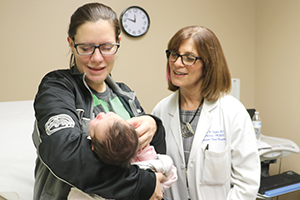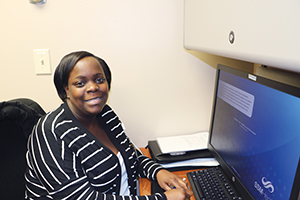By BETSY TAYLOR
RICHMOND HEIGHTS, Mo. — When 30-year-old Emily Keener cradles her baby Isabella and smiles at her in an examination room at SSM Health St. Mary's Hospital, her daughter has no way of knowing the personal dragons her mother has slayed on her behalf.

Emily Keener, left, and her baby Isabella visit with Dr. Jaye Shyken at the Women and Infant Substance Help Center at SSM Health St. Mary's Hospital in Richmond Heights, Mo. Shyken, the center's medical director, and a team provide specialty prenatal care and social services to women trying to overcome opioid dependency. Keener was five months clean of heroin at the time of her visit earlier this year.
Photo by Betsy Taylor/© CHA
As a pregnant woman addicted to heroin, Keener wanted to stop using the drug she feared could harm her unborn baby, but needed help. And, she figured if she admitted she had a problem, authorities would take her daughter away from her at birth. She has two other children, born when she was not using heroin, and she wanted to be a healthy for them as well as for herself.
Keener said her late parents struggled with drugs off and on, and she tried to get them into treatment. She never thought she'd become a drug user, but said she tried heroin after the birth of her first two children and "fell right into it." She has tried to get clean before, but relapsed.
Keener worked up the courage to speak with a nurse available to her through her Medicaid plan, who referred Keener to the Women and Infant Substance Help Center on St. Mary's campus in this St. Louis suburb. Keener got off heroin during her pregnancy, with regular visits to the center, maintenance medication to reduce her drug cravings, counseling and a move into a home for pregnant women that provides social services.
"The WISH clinic is where I found hope, really," Keener said. "I couldn't change my past, but I had a future." Today, a sober Keener is raising her healthy 3-month-old baby, her 6-year-old son and 7-year-old daughter.
Preserving the mother-child bond
The WISH Center specializes in prenatal care for women dependent on opioid drugs. It opened in 2014 and expanded into a new space last year, said the center's medical director, Dr. Jaye Shyken, an obstetrician/gynecologist with a subspecialty in maternal-fetal medicine. It's open five days a week.
As opioid use has skyrocketed in the United States, there has been a fivefold increase in the number of babies born dependent on opioids from 2000 to 2012, with an estimated 21,700 babies diagnosed with neonatal abstinence syndrome in 2012, according to a National Institute on Drug Abuse 2015 summary about the syndrome. The institute is part of the National Institutes of Health within the U.S. Department of Health and Human Services.
When opioids pass through a woman's placenta to the fetus during pregnancy, the baby can become dependent on the drugs. Babies aren't born addicted, said Shyken, since they are not choosing to use drugs and aren't emotionally dependent on the narcotic. Infants born with opioid dependence develop neonatal abstinence syndrome as the drugs leave their system.
Symptoms of the syndrome include high-pitched and inconsolable crying, seizures and gastrointestinal problems. Clinicians try non-pharmacologic interventions. If those don't work, these babies initially are treated with medication such as morphine to moderate their withdrawal symptoms and then tapered off the medication. Babies with neonatal abstinence syndrome have longer and more costly hospital stays than healthy babies, according to the National Institute on Drug Abuse.
Word-of-mouth keeps center busy
As the country grappled with a mounting opioid epidemic, Shyken saw a growing number of obstetrics patients who were addicted and using opioids during their pregnancies. (Her practice draws from eastern Missouri and Southern Illinois.)
She got licensed to provide medication-assisted treatment, an approach that combines behavioral therapy and medications that reduce drug cravings.
She also got approval from SSM Health's board to create a center to coordinate the care of pregnant women trying to overcome their addictions. Shyken said the WISH Center perfectly advances SSM Health's Catholic mission in that it works to promote health and preserve families.
The WISH Center opened in 2014 as a half-day specialty clinic within the SLUCare Physician Group's department of maternal and fetal medicine, where Shyken practices. (SLUCare is Saint Louis University's physician organization and many of its doctors work within the SSM Health System.)
SSM Health did not advertise the WISH Center's existence, but word spread and referrals increased. It was clear within a matter of months that the center needed to expand its hours, staff and offices as the requests for appointments grew.
High-risk pregnancy
Shyken said that prior to a new patient's visit to the center, a nurse does a brief phone assessment, and a social worker may talk to the woman before her first appointment as well. The center's staff includes a receptionist, three nurse practitioners, two nurses, a sonographer and two social workers. Many of them work part of the time at the center, and part time elsewhere on the hospital campus. A pharmacist who specializes in perinatal pharmacy also works with the center, and a fellowship is being added in addiction medicine, one of only about 40 such fellowships in the nation. Shyken will test to become board certified in addiction medicine this fall.
Shyken and a nurse practitioner do the intake appointments and initial patient assessments at the center. Shyken is the primary provider for some patients; others are co-managed by Shyken and the woman's referring obstetrician.
The center's patients have high-risk pregnancies. Risks for the mother include overdose; infections including infection of the heart valve, or endocarditis; pneumonia; HIV; hepatitis C. Anything that is life-threatening to the mother is life-threatening to her fetus, Shyken explained. Patients have detailed, frequent appointments, but no more so than other women with high-risk pregnancies, she said.
Medically managed addiction
Shyken educates patients about the adverse effects of drugs and alcohol during pregnancy, and she discusses treatment options.
All WISH Center patients commit to begin a chemical dependency treatment program within 28 days of their visit to the WISH clinic. Separate from the WISH clinic, these programs commonly include individual counseling, group therapy and skills building as the women seek to address underlying issues that may have led to addiction, which is a chronic, progressive disease.
The center doesn't refer women for detoxification during pregnancy. Women using cocaine don't require a detoxification program to stop using it; women using benzodiazepines, like Valium or Xanax, are supervised by Shyken as they taper off and discontinue the medication.
Shyken starts her opioid-addicted, pregnant patients on maintenance medication therapy, not detoxification, as the rate of relapse after detoxification is high for all people addicted to opioids, she said. She refers some patients to a methadone clinic where they receive daily doses of the maintenance drug. In other cases, Shyken prescribes buprenorphine to patients at the WISH Center. Both buprenorphine and methadone reverse withdrawal, curb cravings and help prevent relapse.
A portion of these maintenance drugs are transmitted to the fetus, so there remains a risk for neonatal dependence at birth. However, maintenance medications provide protection for the mother who is not using heroin and exposing herself and her fetus to risks associated with street drugs of unknown potency and dirty needles, Shyken said.
Maintenance therapy combined with chemical dependency treatment gives many WISH Center patients a path forward to sobriety.
Shyken estimated about 75 percent of the women might relapse if they tried to go off drugs on their own. The WISH center did not have data on how many of its patients have relapsed. The center reviewed the cases of the first 43 of its patients who were taking buprenorphine and found only a small percentage of them, 15 percent, tested positive for illegal or unprescribed controlled substances at delivery.
A dose of tender, loving care
Shyken said the patients she treats may lack positive support systems and don't always sense that people care for them. She makes an effort to "validate their ability to take care of themselves and their ability to parent."
Keener said she lost self-esteem while struggling with her addiction; now she's rebuilding it. Shyken, she said, "helped me realize I am a woman of worth."
Keener said maintenance medication alone wouldn't have helped her overcome heroin; she needed to commit to self-care and therapy to talk through her problems and learn new skills.
During her visits to the WISH Center, staff took her emotional temperature and asked about coping skills she was learning through her addiction recovery therapy.
"I thank God that I got help at all, because I know some women don't," Keener said.
|
WISH Center offers multifaceted support for women in recovery

Social worker Sonya Reid assesses WISH Center patients and suggests resources for them. Social workers provide brief, supportive counseling to patients at the prenatal clinic, facilitating substance abuse treatment, among other services.
In addition to prenatal care, the Women and Infant Substance Help Center provides social services to aid drug addicted pregnant women in taking steps toward establishing a safe, stable home life for themselves and their babies.
The center's social workers perform psychosocial assessments of patients to determine the underlying causes of their addiction and available systems of support. Some patients already may be in a recovery program or want help finding one. Some women seek referrals for behavioral health services.
Sonya Reid is a social worker at the WISH Center, part of SSM Health St. Mary's Hospital in suburban St. Louis. Often, Reid's clients may ask for assistance finding a sober living environment that accepts women with infants and children, or a maternity home with addiction recovery services.
Reid provides patients with applications for government assistance, including one for the Supplemental Nutrition Assistance Program. Some WISH Center patients ask the social workers how to proceed with placing their babies for adoption. Others want to know about community organizations that provide items and gear for newborns.
Reid refers uninsured patients to a SSM Health financial counselor, who can help those who are income eligible apply for Medicaid coverage. Missouri did not expand Medicaid under the Affordable Care Act, but pregnant women whose household income does not exceed 196 percent of the poverty level can get Medicaid coverage that expires 60 days postpartum.
That expiration can be an obstacle for women in therapy or undergoing other medical treatment for opioid addiction, said Dr. Jaye Shyken, medical director of the WISH Center. The social workers help patients access ongoing substance abuse treatment and can also help the baby's father or other family members get into drug treatment programs.
Women at delivery are tested for drugs of abuse in the urine based on a list of medical criteria and regardless of their age, race, economic status or background, Shyken said. If a newborn screens positive for opiates unexplained by medication given to the mother shortly before birth, a social worker reports the positive screen to the Missouri Department of Social Services. A representative of the department meets with the mother, usually within 24 hours, and sooner if necessary, to determine next steps.
An SSM spokesperson explained these are standard, mandated procedures followed by Missouri hospitals.
Testing positive for illegal drugs is rare for WISH Center patients at delivery, because the thrust of the program is to help them manage or overcome their addiction and to have a safe delivery for mother and child.
Many WISH Center patients have relationships with a social worker from the center who has helped ensure the woman has the resources to safely bring home her baby. The social worker knows the patients and becomes the patients' advocate, when appropriate, the SSM spokesperson explained.
— BETSY TAYLOR
|
Copyright © 2017 by the Catholic Health Association
of the United States
For reprint permission, contact Betty Crosby or call (314) 253-3490.